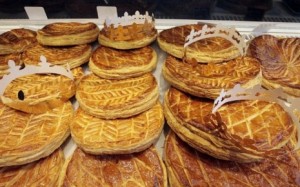Today is the end of the holiday season, the twelfth day of Christmas, the Sunday before the return to school. It’s also Epiphany, or the feast day that celebrates the Three Magi’s arrival at the Nativity Scene. Here in France it’s celebrated by buying a “galette des rois” or “kings’ cake.” These flat, flaky pastries, made with croisssant-type dough and filled with a thin layer of almond paste, are prominently displayed in every bakery and supermarket I’ve seen in Paris. Inside each is a “fevre,” or favor, and a paper crown is included with the purchase.
According to my daughter’s French children’s daily newspaper, Mon Quotidien, the tradition is for a child to hide under the table, cut the cake, and distribute the pieces. The person whose slice contains the favor is crowned king or queen for the day. He or she dons the paper crown and makes a wish. We followed these instructions yesterday (a bit early) and my husband James was the lucky winner, finding a tiny pink plastic croissant on his fork.
He couldn’t decide what to wish. Back when this custom started, the decision might have been much easier.
Mon Quotidien explains that the king’s cake can be traced to ancient Rome. Noble families celebrated with their entire households, and slaves who received the special piece of cake (implanted with a dried bean, not a plastic croissant) could ask for their freedom. This was not a game to them. We’re lucky that it is for us.
That’s my epiphany. During this month, we Americans also celebrate the 150th anniversary of the Emancipation Proclamation, when, on January 1, 1863, Abraham Lincoln ordered the freedom of all slaves in Confederate States that did not return to the Union. So when James donned his crown, I thought not only of Caspar, Melchior, and Balthasar, but of our native Wise Man, too.
